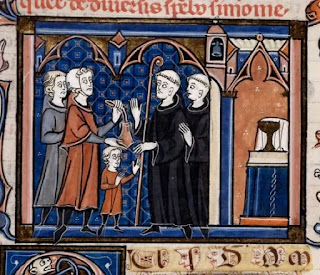Born about 1057, he might not have been raised from early on with the thought that he would have to rule some day, but when the second son Richard died in a hunting accident in the New Forest in 1070, Rufus' destiny altered course. He would have made an odd-looking person, never mind a king. According to William of Malmesbury, Rufus was
...well set; his complexion florid, his hair yellow; of open countenance; different colored eyes, varying with certain glittering specks; of astonishing strength, though not very tall, and his belly rather projecting.
He was also given to mischief as a child. Orderic Vitalis, a contemporary historian, wrote that the younger sons William and Henry, in a moment of great boredom and little discretion, emptied a chamberpot from an upper story onto Robert. Their father had to break up the ensuing fight.
After becoming king, he had to deal with the Rebellion of 1088 (led partially by his uncle, Bishop Odo), which he defeated. In 1091 he decided to invade Normandy and successfully captured some lands from Robert. He made it up to Robert by promising to help him recover some of his land that had been taken by France. (Their joint venture failed.)
In 1097 he initiated the construction of Westminster, the largest Hall in England.
He took the secular side (naturally) of the Investiture Controversy. In the case of England, bishops and abbots were feudal subjects of the king, and so he was less concerned about clashing with them over the subject of investing clerics. He then made a tactical error in this regard: he nominated as Archbishop of Canterbury the greatest theologian of the age, Anselm of Bec. Their conflict would mirror one between a future king of England and his archbishop, but I'll talk about William and Anselm's conflict tomorrow.















